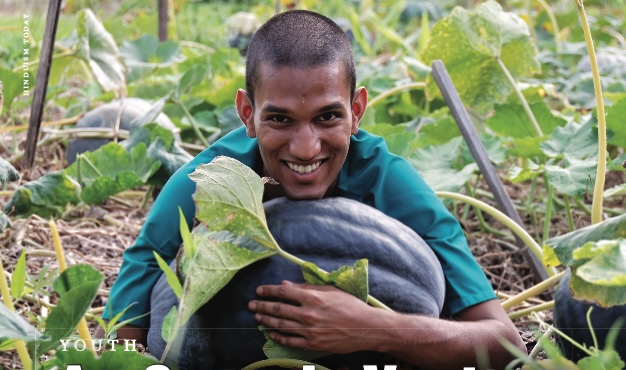BY TRISHUL SIDDHARTHAN
With human-influenced global calamity on the rise, many in my generation have decided to incorporate environmentally friendly practices into our lives and daily routines. Recycling, hybrid vehicles and solar power are the rave in an attempt to transform an industrial infrastructure into a more sustainable and environmentally sound system. I was inspired by my love of gardening, and by the idea of decreasing my environmental footprint through every meal, to dig into organic gardening to till my backyard and cover every arable square foot with “organic” plants.
This proved to be more difficult than I had imagined. I had some free time between college and medical school, but I never thought I would be spending my summer hours on back-breaking work, digging out two feet of soil in the high heat of Miami, mixing in peat moss and cow manure and finally adding a thick layer of mulch.
The key to organic food is the soil. A wise gardener once told me that if I do only one thing, it should be to protect and nurture the soil that holds my plants. From the soil all else will grow. To be certified organic means that no man-made chemicals can touch the soil I planted in. That couldn’t be too hard, I thought; people were farming long before those chemicals were invented.
The modern organic movement got underway in the early 20th century, propelled by two Westerners who had been profoundly influenced by my ancestral home, India. The British botanist Sir Albert Howard, working in Bengal as an agricultural advisor from 1905 to 1924, concluded that Western “scientific ” agricultural practices were inferior to the traditional Indian methods. His findings are explained in his influential book, An Agricultural Testament. And in Germany, the Austrian Rudolph Steiner developed a comprehensive organic farming system which he called biodynamic agriculture. Steiner was very active in the Theosophical Society, which is rooted in Hindu and Buddhist mysticism; its headquarters is still located in Adyar, Tamil Nadu, not far from where my own parents were raised.
Steiner believed that the world and everything in it has a spiritual nature, and that inorganic matter cannot supplement the soil spiritually as organic matter can. Sustainable farming practices are based on the principle of harmony between organisms within the soil, which harbor a rich and diverse community ranging from earthworms to microscopic bacteria.
I proudly purchased 40-pound bags of cow manure and carried them through my house to the backyard. These would be the soul and heart of my garden beds and future plants. To thwart harmful nematodes, which can severely damage many crops, I armed my garden with marigolds. The roots of these lovely flowers produce natural chemicals toxic to nematodes.
I did not realize that it can take several years to build a healthy soil. When starting an organic garden, the first years can be quite discouraging. My corn was devoured by aphids and wilted to the ground, but the rest of my crops–beans, squash, tomatoes, peppers, cucumbers and assorted herbs–did well.Ê
I found a studyÊconcluding organic crops attained a 95% yield when compared to those grown under chemical methods. Over the long run, the unsustainable, soil-depleting practices of chemical agriculture cannot compare with soil-building organic practices. A recent Cornell University study found that around the world, soil is being swept and washed away 10 to 40 times faster than it is being replenished; see http:/www.news.cornell.edu/stories/March06/soil.erosion.threat.ssl.html. [http:/www.news.cornell.edu/stories/March06/soil.erosion.threat.ssl.html.] A Purdue University webpage (http:/www.ces.purdue.edu/extmedia/AY/AY-228.html [http:/www.ces.purdue.edu/extmedia/AY/AY-228.html]) points out that soils high in organic matter are less susceptible to erosion.
Converting a suburban backyard to food production presented some unanticipated challenges. Food plants are not as decorative as flowers, and my disorderly network of wooden trellises and shade cloth did not enhance visual appeal. One friend describes my backyard as a shantytown. But to me there is beauty in a row of peas growing up and over a bare wooden trellis. I see a spiritual splendor in my simple, homey vegetable garden, especially when contrasted with the surrounding metropolis of Miami.
My parents, generally supportive of my endeavors, were less than delighted at losing their well-kept lawn. It didn’t help that while digging the garden bed, I encountered a sixty-year-old sprinkler system. A word to the wise: don’t cut a pipe running through your backyard when you don’t know what’s inside it. Attempting to remove the pipe, I caused a flood that cost $200 to fix.
I believe that the decrease in food costs and the lessened environmental impact will pay off in time. Furthermore, I consider growing and buying organic products an extension of ahimsa. Whereas Western theology considers that nature is a gift from God to be exploited, Hinduism sees God as present within nature. Environmentally sound practices are a part of a greater Hindu legacy of honoring the earth and all living beings and seeking to do harm to none. Organic gardening is one small Gandhian step in this direction. I am hopeful that these considerations will eventually dispel my parents’ ire and earn their enthusiastic approval of our backyard vegetable garden.
